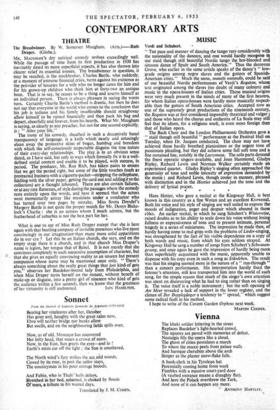MUSIC
Verdi and Schubert. • " Tun pace and manner of dancing the tango vary considerably with the nationality of the dancers; and one would hardly recognise in our staid though still beautiful Nordic tango the hot-blooded and sinuous dance of Spahi and South America." Thus the decorous Grove, who earlier in the same article speaks of the dance's " low- grade origins among negro slaves and the gutters of Spanish- American cities." Much the same, mutatis mutandis, could be said of our beautiful Nordic performances of Verdi's Requiem, whose text originated among the slaves (no doubt of many colours) and music in the opera-houses of Italian cities. Those musical origins were very much present in the minds of many of the first healers, for whom Italian opera-houses were hardly more musically respect- able than the gutters of South American cities. Accepted now as one of the supremely great productions of the nineteenth century, the Requiem was at first considered impossibly theatrical and vulgar ; and those who heard the chorus and orchestra of La Scala may still feel that its idiom, for a religious work, is even more foreign than that of Italian opera.
The Bach Choir and the London Philharmonic Orchestra gave a " staid though still beautiful " performance at the Festival Hall on Tuesday, when Dr. Jacques conducted. The choir may not have achieved those hardly breathed pianissimos or the urgent tone of passionate pleading, but they did achieve some full soft tone and a fine sustained line, notably in the Lacrymosa. The solo parts demand the finest operatic singers•available, and Joan Hammond, Gladys Ripley, Richard Lewis and Norman Walker certainly made an experienced quartet. Gladys Ripley's singing often approached the generosity of tone and noble intensity of expression demanded by the music ; and Richard Lewis, though cooler in manner, phrased with distinction and-in the Hostias achieved just the tone and the delivery of lyrical prayer.
- * . Hans Hotter, who gave a recital at the Kingsway Hall, is best known in this country as a fine Wotan and an excellent Kurwenal. Both his voice and his style or singing are well suited to express the moods of indignation, anger and despair which abound in those roles. An earlier recital, in which he sang Schubert's Winterreise, raised doubts as to his ability to scale down his voice withou) losing fullness or expressiveness of tone and to present intimate, personal tragedy in a series of miniatures. The impression he made then, of hardly having come to real grips with the problems of Lieder-singing, was strengthened by the fact of his visible dependence on a copy of both words and music, from which his eyes seldom strayed. At Kingsway Hall he sang a number of songs from Schubert's Schwanen- gesang, and once again he gave the impression of hardly being more than superficially acquainted with the music, apparently unable to dispense with his copy even in such a song as Standchen. The result was that his singing seemed more in the nature of a " run-through " than a concert performance. His interpretation hardly fixed the listener's attention, still less transported him into the world of each song, for the simple reason that much of the singer's own attention was spent on discovering what he had to sing rather than on singing it. The voice itself is a noble instrument ; but the soft opening of Am Meer revealed a lack of support in the lower register, and the climax of Der Doppleganger a tendency to " spread," which suggest some radical fault in his method.
I hope to write of the Covent Garden Orpheus next week.
MARTIN COOPER.


































 Previous page
Previous page